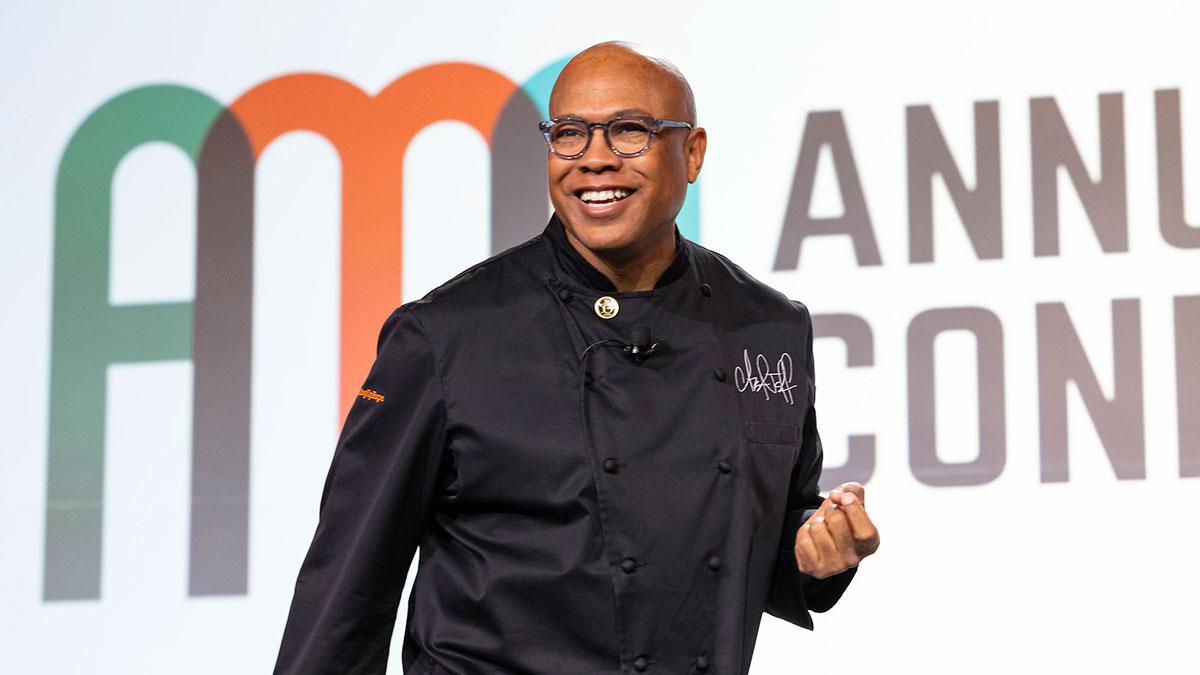By: Mark Baum, Chief Collab oration Officer and Senior Vice President of Industry Relations, FMI
oration Officer and Senior Vice President of Industry Relations, FMI
I’ve visited retailers all over the world, on virtually every continent except Antarctica. No matter the language or the terrain, retailers consistently take care of their customers and communities in the areas in which they operate. In the U.S., the COVID-19 pandemic created new requirements for retailers to keep Americans safe, fed and secure, and at a time when many businesses were forced to close their doors or lay off workers. During this unprecedented time grocery stores increased their total number of employees by 10%, or roughly 500,000 individuals.
This hiring demand continues, but there are challenges for grocery businesses to keep up with the sudden shift to more breakfasts, lunches, snacks, dinners, desserts and cocktails shared at home. FMI’s operations data suggest that turnover in food retail was 40% before the pandemic and 46% said COVID-19 made it harder to recruit and retain people. Retailers told us they addressed this tension by focusing on a range of benefits for associates – to the tune of nearly $40 billion – including higher compensation; bonuses; flextime; training and skills development; employee wellness programs; education programs; and hiring and retention incentives.
FMI understands through a new survey we supported with Deloitte on the future of our workforce that the food industry can and should continue to rally around the strategies and investments it employed during the pandemic to continue the trend toward economic recovery. The study demonstrates how technology and new sources of talent are together unlocking new possibilities for the food industry.
Further, we predict that roles will adapt and evolve based on the agile and ever-changing nature of our trade, especially when it comes to technology and the rapidly maturing omnichannel marketplace. In particular, retailers invested in technological advancements to accommodate consumer demands, spending nearly $450 million on technology for online shopping. To accommodate the delivery of online orders, grocers invested $1 billion in delivery services or partnerships with third-party providers. These investments are shifting the types of job opportunities within the industry, but they’ve also created some pain points. Media headlines suggest companies are indeed aggressively hiring, but according to our work with Deloitte, for food retailers, talent availability (44%) is the foremost challenge, followed by talent retention (40%) and retraining and reskilling employees for new technologies (39%). Likewise, for product suppliers, talent retention and driving company culture are both top concerns (45%), followed by attracting emerging, high-demand skillsets (36%).
While this research paints a landscape of some of the common challenges employers are managing regarding maturity, goals, roadblocks and investment, as an industry we remain committed to the future of work by offering far more than just a paycheck. For example, FMI recently celebrated the 200 recipients of this year’s Food Retail Leader Certificate to make up more than 750 industry leaders who are helping to build the food industry of tomorrow.
During this challenging time, great leaders will emerge, but it’s important we ask ourselves the most important and urgent questions that shape the future of work. We want to ensure our labor force feels as though they are being invested in and integral to our success. It is one of our strategic imperatives.
To dive deeper into our future of workforce series with Deloitte and learn about ways in which employers can support talent, visit www.FMI.org/Workforce.


 Industry Topics address your specific area of expertise with resources, reports, events and more.
Industry Topics address your specific area of expertise with resources, reports, events and more.
 Our Research covers consumer behavior and retail operation benchmarks so you can make informed business decisions.
Our Research covers consumer behavior and retail operation benchmarks so you can make informed business decisions.
 Events and Education including online and in-person help you advance your food retail career.
Events and Education including online and in-person help you advance your food retail career.
 Food Safety training, resources and guidance that help you create a company food safety culture.
Food Safety training, resources and guidance that help you create a company food safety culture.
 Government Affairs work — federal and state — on the latest food industry policy, regulatory and legislative issues.
Government Affairs work — federal and state — on the latest food industry policy, regulatory and legislative issues.
 Get Involved. From industry awards to newsletters and committees, these resources help you take advantage of your membership.
Get Involved. From industry awards to newsletters and committees, these resources help you take advantage of your membership.
 Best practices, guidance documents, infographics, signage and more for the food industry on the COVID-19 pandemic.
Best practices, guidance documents, infographics, signage and more for the food industry on the COVID-19 pandemic.
